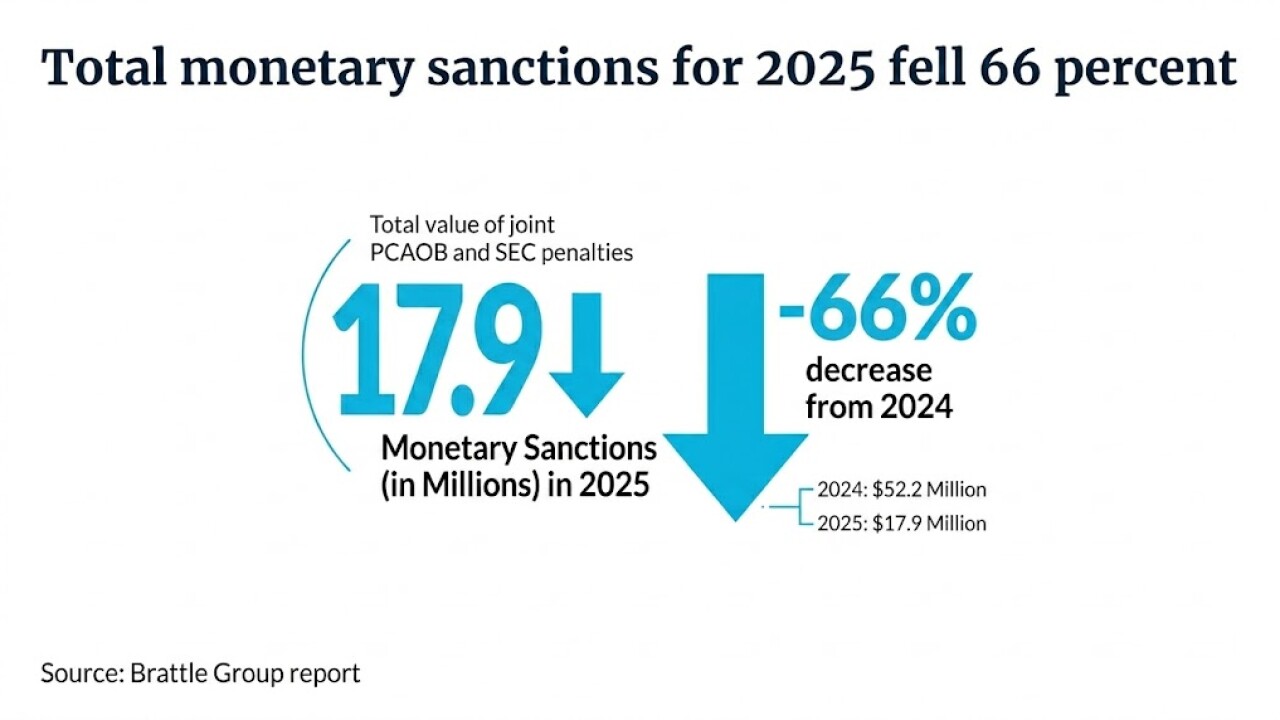The Public Company Accounting Oversight Board released its 2020 inspection reports Monday for the Big Four firms — Deloitte, Ernst & Young, KPMG and PricewaterhouseCoopers — as well as BDO USA and Grant Thornton, showing mixed results.
For Deloitte, the PCAOB found that two of the 53 audits it inspected in 2020 had significant enough deficiencies to include in Part 1A of the
“Our outstanding results in the 2020 PCAOB Inspection Report are reflective of our continued focus on executing high-quality audits and further illustrate our position as the sustained leader of audit quality,” Deloitte said in a statement Monday. “Our success in transforming the audit and advancing audit quality is affirmed by our position in the marketplace. Deloitte is the only professional services organization among the Big Four that saw a net increase in the number of public company audits in each of the last six years.”

For PwC, there was only one audit out of the 52 reviewed that was found to be significant enough to be included in Part 1.A of the
“PwC values the critical role that the PCAOB plays in promoting audit quality through its inspection process,” the firm said in a statement. “We are proud of our record on quality and our exceptional results of the PCAOB 2020 inspection report of PwC’s 2019 audits ... . Our profession-leading results, as outlined in the report, reflect the steps we’ve taken to sustain a strong culture of quality in our firm.”
Wes Bricker, PwC vice chair and U.S. trust solutions co-leader, pointed to the improved results in a
Those trends are in line with what the PCAOB saw in general for its inspections last year, where audit quality showed some signs of improvement, although problems persisted (
At Ernst & Young, the PCAOB found that eight of the 52 audits reviewed in 2020 had deficiencies serious enough to spotlight in Part 1.A of the
“Our top priority continues to be serving the public interest by executing high-quality audits with integrity, independence and professional skepticism,” wrote EY U.S. chair and managing partner Kelly Grier and U.S. vice chair of assurance John King in response to the findings. “To this end, our commitment to continuous improvement in audit quality never wavers.”
KPMG fared somewhat worse, with 14 of the 53 audits reviewed in 2020 considered to have significant enough deficiencies to include in Part 1.A of its
“We value and respect this process and have reviewed the observations identified in Part I of the report,” KPMG chair and CEO Paul Knopp and vice chair of audit Scott Flynn wrote in response to the report. “We have taken appropriate actions to address the engagement-specific findings in accordance with PCAOB auditing standards, as well as our own policies and procedures.”
At Grant Thornton, five of the 29 audits reviewed in the 2020 inspection report had deficiencies significant enough to warrant inclusion in Part 1.A of the
GT has taken steps in recent years to improve audit quality. “Quality is our highest priority at Grant Thornton and we are committed to its continual advancement,” wrote Grant Thornton CEO Bradley Preber and national managing partner of audit services Janet Malzone. “One of the ways we advance quality is through our robust root cause program wherein causal factors are identified for both positive and negative quality results, combined with an analysis of quality indicators. The ongoing cycle of monitoring, identifying where improvements are warranted, recognizing causal factors, and developing actions drives continual improvement in our audit approach and execution. In addition, our Audit Quality Advisory Council, which includes two outside members, advises our Partnership Board and senior leadership team on our audit quality, and provides deep, practical and objective advice regarding ways we can continue to deliver high quality.”
Finally, for BDO USA, 13 of the 24 audits inspected in 2020 had deficiencies significant enough to include in Part 1.A of the
“We remain committed in making audit quality our top priority,” BDO USA said in a statement in the report. “The PCAOB’s inspection process assists us in improving our audit performance and our underlying quality control systems. We look forward to continuing to work with the PCAOB on the most effective means of achieving this objective.”





